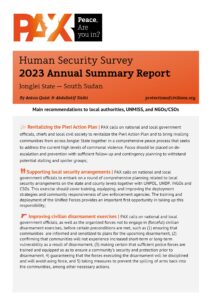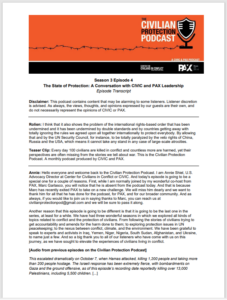Working on the protection of civilians in times of corona
The full effects of the COVID-19 in conflict and post-conflict countries is expected to be far worse than what is being seen in Europe, with numerous second and third order effects which are yet to fully emerge. How does the coronavirus impact the work of our partners and team?
HSS Iraq: online SGBV pilot study and pop-up awareness campaigns
From the first official case which was identified by the Iraqi Ministry of Health in the Southern governorate of Najaf on 24 February, until 30 March 2020, a total of 547 officially reported cases have been reported, along with 42 deaths. However, critics fear that these official figures are not trustworthy, and that the incidence of the virus is much greater. There is a general shortage of hygiene supplies as well as sterilisation equipment in the market, as even public health institutes are reporting a dire shortage of masks, gloves and other protective material. Extensive awareness sessions are also needed in rural areas, as there is limited outreach in terms of warning them on the dangers of the pandemic, and the need for social distancing. An extensive update on the impact of the coronavirus in Iraq can be found here.
Together with youth groups from Basra, our partner, the Iraqi Al-Firdaws Society, led an educational campaign targeting poor areas which suffer from lack of services, especially the health one and how to protect people from the COVID-19. The campaign included distribution of hygiene materials, detergents, masks and plastic gloves in addition to awareness leaflets on how to deal with cases of infection and how to avoid touch with people in public places and how to maintain personal hygiene and using disinfection materials to preserve people’s safety. However, since the curfew was extended to include NGOs in Basra, the team has been unable to carry out with its campaign, as well as other regular activities or monitoring and evaluation initiatives.
All HSS field operations in Iraq have been suspended until it is safe for our respondents, enumerators and partner staff to interact face to face. Together with our partner, the Iraqi Al-Amal Association, a pilot study has also gone live to validate the quantitative findings we have for the incidence of sexual and gender-based violence (S)GBV) in the three targeted governorates of Kirkuk, Basra and Salahaddin using remote data techniques. Once the findings are validated, the study will also test out advocacy messages relating to gender, peace and security, in these targeted governorates, for PAX’s project on gender, peace and security. The team is also liaising with other institutions through which we can validate HSS findings on the perceptions of safety and security by targeting university students, again through remote data collection techniques. The proposed study will also engage with these students, who are the future Iraqi leadership, on how they want the future of the country to look like, and how this future needs to be achieved.
HSS South Sudan: prevention is the main priority
In South Sudan no COVID-19 cases are confirmed yet, however the country is surrounded by countries where the virus has infected growing numbers of people. The recently formed government by the government and former armed opposition, has taken preparatory measures largely inspired by the measures taken in affected countries around the world: suspension of social gatherings of more than 10 persons, closing of schools, offices and non-essential shops, restricting public transport, and suspension of international flights and border crossings, etc.
Although these measures bear resemblance to the measures taken in western countries, the difference is that none of the parallel social security mechanisms were included to salvage people’s livelihoods and support the (informal) economy. So by severely limiting people’s opportunities to earn a living and survive during the upcoming weeks and maybe months of lockdown, but enforcing the measures with (the threat of) force and imprisonment, there is potential for a lack of popular support for, limited implementation of and possibly even active popular resistance against the measures.
When an outbreak of COVID-19 will occur (this seems only a matter of time), the results could be potentially disastrous for South Sudan. The medical sector in the country is poorly covering the vast inaccessible countryside, and even in places with access to medical care it is underresourced, understaffed and hardly coping with the health challenges generally faced by South Sudanese. Any outbreak of COVID-19 will therefore probably bring the medical sector to its knees when overflooded by patients, and the mortality rate could be high. The South Sudanese Doctor’s Union has already expressed its concern about the lack of protective materials, professionally equipped ICU units as well as testing possibilities (which is likely the reason why South Sudan hasn’t seen any confirmed cases yet until this date), as well as opportunities for isolating patients and protecting its health workers and wider communities.
For the time being, all planned HSS field activities in South Sudan, such as enumerator trainings, data collection and community dialogues, are suspended until further notice. The local office in Juba has decided to hibernate, although the limited IT-infrastructure means that considerable preparations have to be made so that local staff can effective work from their homes. Due to logistical challenges, opportunities for working remotely in the various survey locations are very limited, but we will consider supporting small scale community peace activities through the Community Security Committees (COMSECOMs) where possible.
Protection in Practice: discussion on Hawija, civilian harm, accountability, and transparency continue online
The new Protection in Practice project will have to postpone or cancel several meetings and activities that require traveling. Instead, we will prioritise virtual meetings and desktop research that was ongoing and push new research assignments forward in our planning. Most activities can largely continue, albeit in a somewhat adapted form.
One of our main priorities at the moment concerns our engagement with the Dutch Ministry of Defense (MoD): In late 2019, the story broke that Dutch airstrikes on the Iraqi city Hawija in 2015 had led to seventy civilian casualties, which the Dutch government had not acknowledged for years. Together with a group of like-minded civil society organizations and researchers, we are currently working to engage the MoD in a longer-term process to improve its civilian harm tracking and reporting. While we had foreseen a series of roundtable discussions, we have had to adapt by taking this work online. Nonetheless, as we also hope to engage parliament in this process, progress is slowed down by the fact that parliament currently is not in full speed.
Other notable activities concern a number of research projects and consultancies related to civilian harm (tracking), data for peacekeeping, and in-mission evaluations. We are using the time we have now to conduct some preliminary research to uncover research gaps and needs, which can go ahead relatively unaffected by the current conditions. Preparations for a book on pathways to civilian harm and organizing virtual round tables on PoC related topics can continue as planned. Whether and how we can continue with planning for events and/or training sessions for the military is, however, uncertain at the moment.
Engaging International Actors: UN and NATO HQ activities postponed, focus on the Netherlands
The new Engaging International Actors project will also have to postpone or cancel several meetings and activities that require traveling. At the moment both NATO and UN are putting in place a series of mitigation measures to promote the safety, security and health of all personnel while maintaining continuity of operations. Main UN buildings are closed until further notice as a part of the effort to limit the possible transmission of COVID-19, and we are awaiting the news on whether the annual POC open debate will take place this year. Either way, we will suspend all public events and expert-level round table sessions on the sidelines of international PoC discussions until it is safe for national and international practitioners (civilians and military), policy makers in the field of peacekeeping and our HSS partners to travel and interact face to face.
We are currently consulting with our civil society partners on new momentums and are looking for new ways of organizing online events to bring together PoC experts. Upcoming webinars that are open for broader public will be announced on this website or our social media channels.
In the meantime, the Protection of Civilians team is in conversation with the Netherlands Ministry of Foreign Affairs on PoC strategies and capacities and is already planning ahead for activities in the third and fourth quarter of 2020. We will utilize this moment to explore the 2020 theme of the annual PAX PoC event in The Hague, which is, for the time being, scheduled in October/November 2020.
For general updates on the impact of the coronavirus in conflict areas visit the PAX website.
About this news
Date of publication:
Apr 02, 2020
Author:
Selma van Oostwaard
Extra:
Photo: PAX’s partner, the Iraqi Al Firdaws Society is handing out awareness flyers and hygiene materials on the streets and markets of Basra, Iraq (photo: Al Firdaws Society)

